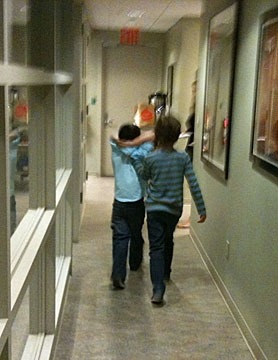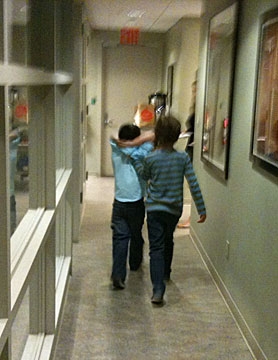Raising A Foodie?
It was, perhaps, the imaginary blood splatter on the walls of Martha Stewart's offices that made me realize just how fully I'd embraced my son's fame. And all that came with it.
Except both boys were in their element — surrounded by food, cameras, and attention. A trinity to be expected for E.J., growing up in the home of one of the world's most recognizable food celebrities.
But I was realizing it also was a course I'd unconsciously plotted for my son, Parker. Maybe not such a smart thing?
I recently needed to travel for work, always a tear-inducing experience for my son. As I left, I tried to soothe him. "You know that when I'm away, I think about you constantly, right? And I'm always talking about you to everyone I meet."
The whimpering stopped. Fast. "Do you think they'll want my autograph?"
Not a good thing, indeed.
Not long ago, parents worried mostly about how much media their children should consume. But as technology morphed and "TV time" was supplanted by "screen time," the question has become more nuanced. Now, we fret over how much children should be exposed in media, as much as to it.
This isn't about child stars. I have friends who won't use their child's real name on their blogs and avoid posting face-forward images of them on Facebook. Online lives forever, after all.
But I swallowed that pill shortly after Parker was born, chronicling in columns and feature stories too numerous his growth, eating habits, and eagerness to be in the kitchen with me.
And why not? I talk-the-line about the importance of involving kids in cooking, might as well walk it. And share it.
(Far left, J.M. Hirsch, his son Parker, and chef Emeril's son E.J. at a filming of Emeril's show.)
It started slowly. By the time he was 3, Parker had appointed himself the official taster of the AP's test kitchen, snatching samples of whatever recipes we were developing or photographing. Photo shoots were his norm, and I joked that when eating at friends' homes he must wonder why they don't photograph their food before eating it. It wasn't long before Parker was the subject of the shoots.
When he hit his frustrating no-vegetables stage, I did what any parent would do. Or rather, I did what any parent with culinary connections might do — I called up Food Network and issued a challenge. Have your stars create vegetable recipes catered to my son's peculiar tastes. I'll write about the process, and the winner.
They did. And I did. And Parker's expression of disgust at Melissa d'Arabian's spinach dish — forever preserved in a widely used AP photo — left the Ten Dollar Dinners star, er, politely nonplussed. We made nice at a party later that year. (Here is the story.) Meanwhile, the experience earned Parker his own Food Network spoof page online.
When I wrote my cookbook not long after, well ... of course I'd include my son. Now the shoots were focused on us, not just the food. And so was he. It would be cute if I had him attend book signings with me, right? Let him practice writing his name. Readers loved it. So did he. He even starred in the book's promotional videos.
Little Kids, Big Knives: Reinventing Weeknight Cooking with J.M. Hirsch.
High Flavor, Low Labor: Reinventing Weeknight Cooking with J.M. Hirsch.
"Food helps us to be healthy and strong," he told Oliver (who was waiting for ME to interview him). "What do your kids eat?" Oliver was a great sport about it. "Anything with pasta. Or chocolate," he responded.
So obviously I'm biased, but still... gutsy for a 6-year-old. I've met reporters more easily intimidated.
Then he saw the bread. White bread. "Doesn't Emeril know that's not healthy?" he said to me. And into his microphone. Loudly. Cringing aside, the kid's right. And you know what? That's the sort of confidence you can't teach. You have to earn it.
Meanwhile, a blog I started about Parker's lunches has become a bit of a phenomenon. A couple weeks ago I was in New York filming a segment with Martha Stewart about it. Do you want to bring your son?
No! And yet, there was his grinning mug up on screen, happily noshing his lunch of Alfredo, spice-rubbed pork tenderloin, and banana bread.
Maybe by indulging our kids in media — rather than just with it, as our parents did —our generation is creating a more egocentric culture. Actually, that ship has sailed; we're already there. And maybe that's not a surprise given our near obsessive focus on fame and so-called reality shows. Remember, you too can be a star.
But media in its many and varied forms is changing how we live and interact with each other, as well as how we see our role in society as a whole. The media experience is increasingly immersive, and will only become more so as technology further blurs the lines between on and offline.
Which presents a fresh struggle for parents. Previous generations faced what now seems a blissfully simple equation — too much TV was bad. You either tried to control it, or not.
Today, it's a far more complex algorithm. How deeply do you let your child be immersed? And in what form? Do you post your kid's birthday pictures? How soon is too soon for Facebook? Do you let her start a blog? How about go on TV?
Parents today are bloggers, tweeters, and all-around online sharers. We shouldn't be shocked our kids want in on that, too. Oddly, I've resolved the old-school parenting dilemma in the extreme. We don't have television, so controlling how much he watches isn't an issue.
Obviously, I've decided being on TV is a different matter.
No question — involving my son so much in my career has left him with an oversized sense of self. We're working on that. But it also has taught him valuable skills and offered him experiences that will help him navigate a fast changing media landscape. Which is kind of crazy. We live in a society where this is the future. I shake my head over that more so than at how I've prepared my son for it.
J.M. Hirsch is the food editor for The Associated Press. For more by the author check out his sites, jmhirsch.com and LunchBoxBlues.com.

